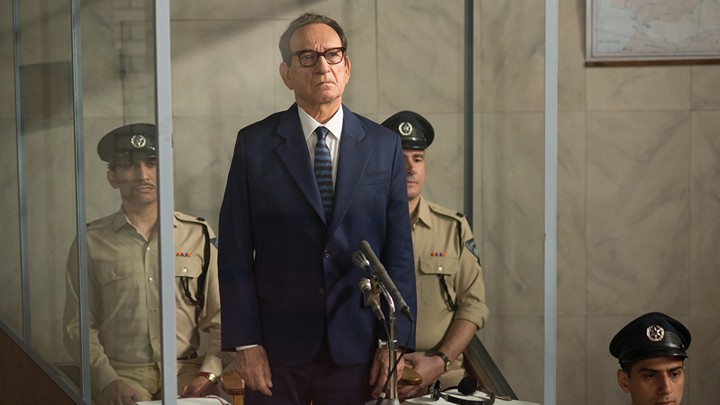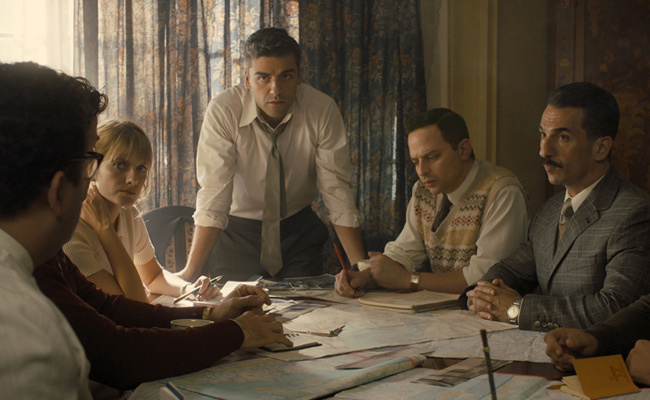Operation Finale (2018)
CAST: Oscar Isaac, Ben Kingsley, Melanie Laurent, Nick Kroll, Haley Lu Richardson, Michael Aronov, Joe Alwyn, Lior Raz, Torben Liebrecht, Greg Hill, Greta Scacchi, Peter Strauss, Russell Simon Beale
REVIEW:
Operation Finale is a well-crafted, sure-handed, engaging spy thriller chronicling in unvarnished docudrama fashion the (mostly) true story of the 1960 mission by agents of Mossad (Israeli secret service) to track down, apprehend, and extradite fugitive Nazi war criminal Adolf Eichmann from his hiding place in Argentina. It’s not the first production about this subject (there is a 1996 TV movie, The Man Who Captured Eichmann, starring Arliss Howard as lead Mossad agent Peter Malkin and Robert Duvall as Eichmann), but it’s the most big-budget and the best quality. It’s a good starting point for anyone unfamiliar with the story, and worth a watch for those who already are, even if it doesn’t really bring much new to the genre.
After an opening prologue in 1954 Austria, and fleeting sporadically interspersed Holocaust-era flashbacks, the bulk of the movie takes place in 1960 Argentina, where a colossal coincidence—Eichmann’s son Klaus (Joe Alwyn) embarking on a fleeting romance with the daughter (Haley Lu Richardson) of a Holocaust survivor (Peter Strauss), has exposed the cold trail of Nazi fugitive Adolf Eichmann (Ben Kingsley). Eichmann, dubbed “the architect of the Final Solution”, was not a particularly powerful figure in the Nazi regime—actually, he was a mid-level bureaucrat—but his administration of the “Office of Jewish Affairs”, and his hyper-efficient organization and implementation of state-sanctioned mass murder left him with a top spot on Mossad’s hit list. The stoic overseer of the operation, Isser Harel (Lior Raz), puts together a small team led by Peter Malkin (Oscar Isaac) and including Malkin’s ex-lover Hanna (Melanie Laurent), friend Rafi (Nick Kroll), rivals Zvi (Michael Aronov) and Yaakov (Torben Liebrecht), and the belligerent Moshe (Greg Hill). Despite some on the team itching to put a bullet between Eichmann’s eyes, this is not an assassination. Rather, Eichmann is to be captured and extradited to stand trial in Israel. As Prime Minister David Ben-Gurion (Russell Simon Beale) states, “for the first time in our history, we will judge our executioner”.
The complicated preparations and capture of Eichmann occupy only the first half of the film. By undertaking the operation, Mossad is wading into murky territory, violating Argentina’s sovereignty by pulling a snatch-and-grab of one of its citizens. 1960s Argentina is a friendlier place for Eichmann than it is for Jews attempting to apprehend him; the movie takes the time to show an underground Nazi and anti-Semitic resurgence taking root within the German immigrant community (many of them ex-Nazis), and the Peron regime Argentinean police working hand-and-glove to aid and abet them. The actual apprehension of Eichmann is easy enough, but things only get more complicated and dangerous once he’s in their custody. The Mossad agents must hide Eichmann in their safe house for days awaiting their flight out, running the risk of being discovered by the forces seeking to rescue Eichmann, including his son Klaus and pro-Nazi local politicians and the police in their pocket, who are scouring Buenos Aires looking for him. And inside the safe house, tension mounts within the group as their efforts to force or persuade the resistant Eichmann to sign a document deemed legally necessary for his transport to Israel seem futile.
 The most interesting element of Operation Finale, especially in the second half, is the one-on-one interplay between Oscar Isaac’s Malkin and Ben Kingsley’s Eichmann as Malkin and colleagues struggle to get Eichmann’s signature. Malkin, doubted by some of his colleagues for tendencies toward impulsivity and violence, tries an opposite approach with Eichmann, seeking to relate to him and get the older man to let down his guard by appearing to do the same toward him. However, by doing so, Malkin opens himself up to the risk of the shrewd Eichmann manipulating him in turn. The most palpably tense moments are between Malkin and Eichmann, including a scene where Malkin contemplates strangling an oblivious blindfolded Eichmann, and another where Eichmann, who would prefer to be summarily executed rather than face trial in Israel (a wish some members of the team would be happy to oblige), uses personal information he has gleaned about Malkin’s family background to attempt to provoke the hot-tempered agent into killing him.
The most interesting element of Operation Finale, especially in the second half, is the one-on-one interplay between Oscar Isaac’s Malkin and Ben Kingsley’s Eichmann as Malkin and colleagues struggle to get Eichmann’s signature. Malkin, doubted by some of his colleagues for tendencies toward impulsivity and violence, tries an opposite approach with Eichmann, seeking to relate to him and get the older man to let down his guard by appearing to do the same toward him. However, by doing so, Malkin opens himself up to the risk of the shrewd Eichmann manipulating him in turn. The most palpably tense moments are between Malkin and Eichmann, including a scene where Malkin contemplates strangling an oblivious blindfolded Eichmann, and another where Eichmann, who would prefer to be summarily executed rather than face trial in Israel (a wish some members of the team would be happy to oblige), uses personal information he has gleaned about Malkin’s family background to attempt to provoke the hot-tempered agent into killing him.
Chris Weitz makes Operation Finale a good-looking film, with postcard-esque cinematography of Buenos Aires, and practices restraint by refraining from graphic Holocaust imagery (the film maintains a PG-13 rating), although Eichmann’s exact role in the Holocaust—that of a pencil-pushing bureaucrat more than a hands-on executioner—could have been better-delineated; those who go in not knowing much about Adolf Eichmann won’t learn much about his Holocaust activities from this film alone. There’s also a bit of gallows humor where the team gets in a bit of a contest over who lost the most family members in the Holocaust. The back-and-forth interplay between Malkin and Eichmann, and Malkin struggling to keep his cool in such close proximity to an oh-so-ordinary “monster” is the film’s strongest element; the movie’s pumped-up and somewhat exaggerated attempts to inject conventional “thriller” elements in the form of a “nick of time” getaway from Argentina, sometimes feels a little tacked-on and manufactured to inject more suspense.
The focus is more on the nuts-and-bolts details of the operation than the personalities of the people involved. Only Malkin gets enough character development to understand a measure of what makes him tick (he is driven by the murder of his beloved sister and her children by the Nazis during the Holocaust), and Oscar Isaac (who also produced) effectively conveys Malkin’s barely-controlled cool. He is offset by Ben Kingsley (doing a 180 from Schindler’s List’s Itzhak Stern), who remains low-key and subdued (restraining his occasional penchant for hammy scenery-chewing) and avoids any stereotypical Nazi mustache-twirling. Eichmann is not a frothy villain, but a bland, outwardly ordinary man who makes an underwhelming impression and saw himself as merely a bureaucrat doing his job; he embodies what political theorist Hannah Arendt called “the banality of evil”. No one else makes much individual impression, although it’s interesting to note that this is the second time Melanie Laurent has found herself as a vengeful Jew mixed up with Nazis, the first being Shoshanna in Inglourious Basterds.
Overall, despite slightly pumping up the “thriller” elements for more dramatic effect, Operation Finale provides a docudrama telling of a true story without wildly distorting the facts, and engages the audience for its two hour runtime. Of the various onscreen portrayals of the capture of Adolf Eichmann, it’s the most worthy production, even if it doesn’t bring many new insights.
* * *
